
by Tes Silverman | Mar 1, 2016 | 2016, Asia, Culture, Marriage, Uncategorized, World Moms Blog, World Voice
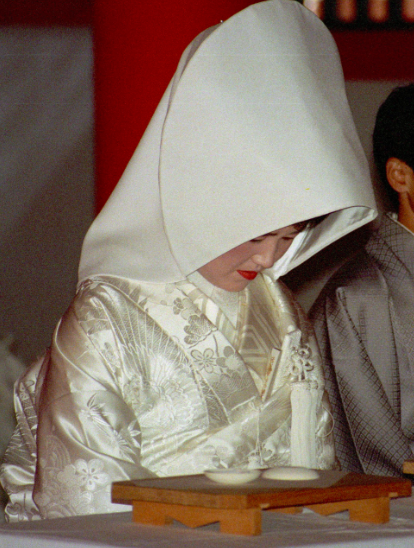 This Thursday, March 3rd, an event in Japan known as Girls Day, a day of reflection and prayers for the health and happiness of daughters, comes at a time when women’s voices are not being heard.
This Thursday, March 3rd, an event in Japan known as Girls Day, a day of reflection and prayers for the health and happiness of daughters, comes at a time when women’s voices are not being heard.
In the past few months, Japanese women have been at the crossroads of maintaining with what’s been traditionally acceptable or fighting to keep their surnames even after marriage.
A number of Japanese women have taken an age-old law to court, claiming that being unable to keep their surnames is a violation of their rights. One of the women, Kaori Oguni, argues, “By losing your surname-you’re being made light of, you’re not respected…It’s as if part of yourself vanishes”.
What has been at play is that an age-old law stemming from the patriarchal system that has dominated the family dynamic since 1896. Dating back from the 1600’s during the Edo period, whereby the population was ruled by the Tokogawa Shogunate (feudal system), the only people who had last names were those of the Samurai class, until the end of the Shogunate, known as the Meiji Restoration in the late 1800’s. This was created in order to create their own identities, separate from the Samurai class.
The current law states that married couples share the same last name, and while the law doesn’t specify whose name should be kept, most women keep their husband’s last name to prevent pressure and criticism from the public, or worse their families. It is now being challenged by some professional women who believe it unconstitutional to ban women from having a choice of whether to change their surnames once they marry.
Part of the problem is the continued use of a family register system that has been used for decades which lists every member of the family, like a census. Unlike the census, a daughter’s name is crossed off the family register once she marries and is added onto her husband’s family register. What is disturbing is that a woman’s surname is easily assigned from one register to another, without thought of ramifications for her or her future.
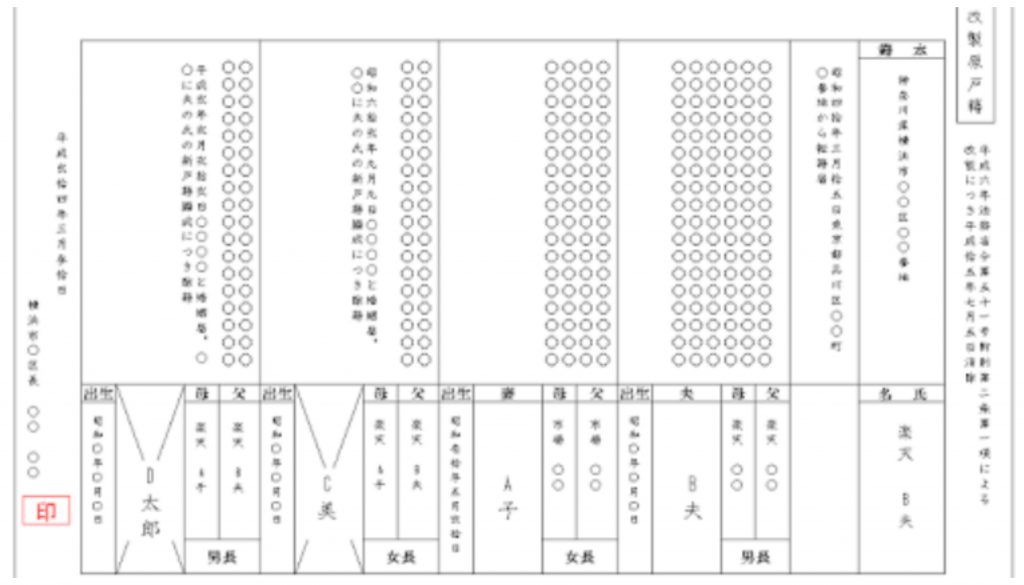
The family register is like a census. The “x” denotes when a woman is divorced, and more than 1 “x” means more than 1 divorce. The family register is how families keep track of their families, but if a daughter gets married, he name is crossed off and added onto her husband’s family register.
According to a source from Japan, this law has affected professional women more so than non-working women. The view has been maintained that the government is providing women a safety net by holding on to the idea of keeping their husband’s last name as future reference with regards to parental rights or inheritance issues. By sharing one surname, it is seen as a way of binding one’s family and women become part of that unit, letting go of their own identity.
In addition to married women, divorced women are just as affected by this law. Once a woman is divorced, her name on the family register is indicated by an “x” and any future divorces would indicate additional “x”s. Once a woman is divorced, she has the option of creating her own register or going back to her parents’ register, but along with having an “x” on the register, it would be noted that it was a result of a divorce. While it may be seen as an efficient way of keeping track of the family system, it seems more like devaluing the woman’s importance in a family.
A few people interviewed regarding this issue believe that it is not just about changing one’s last name, it’s more about having the choice to change it for themselves.
Mrs. U, married for fifteen years never had a problem with taking on her husband’s last name. Her husband had an unusual last name and was proud of it, but over the years, she felt that having to explain her surname is inconvenient. It didn’t occur to her how much paperwork was involved in changing her name on all bank accounts, etc. She also didn’t think at the time how it would affect her sense of self, having grown up with the assumption that one day she would change her name. She wishes now she had given it more thought, though she feels she still would have taken her husband’s name. Her children also have pride in their unusual surname and she wants her daughter to have the option of keeping it, if that’s what she chooses.
Mr. A said that when he was married more than 40 years ago, it never once crossed his mind that his wife would not want to take his surname. When his daughter married 15 years ago, he didn’t feel sad when she changed her name. He always knew that would happen so he was okay with it. But now, he says that Japan is changing and women have a stronger sense of identity. He doesn’t feel that a family having different last names weakens the family unit, though he says many of his peers think this. He hopes his grandchildren will be free to choose whether to share a surname with their spouse or not.
Ms. N is divorced. She hates the practice of x-ing through names on the family register and feels it is discriminatory and an invasion of privacy. She thinks this particular case failed in the Supreme Court because the plaintiff approached it from the angle of ‘I’ve built a reputation and professional name for myself using my maiden name. Changing that disadvantages me.’ Ms. N feels this approach was selfish, bound to fail, and that anti-woman powers that be knew this and used this case to strike down the cause. She thinks if it was approached from an equal rights standpoint, the result may perhaps have been different.
For Asuka Someya-Takahashi, who heads a non-profit organization called PILCON, this law has affected her personally and professionally. “I established a non-profit organization before I was married. Upon my marriage and resulting name change, I needed to file new paperwork with the metropolitan city office and legal affairs bureau. In spite of this, work communication often comes addressed to my maiden name. I am constantly unsure if I should be using my maiden name or married name on invoices, applications for subsidies, etc.”, says Someya-Takahashi.
She adds, “I think if the law allowed couples to choose separate surnames, this kind of complexity could be avoided. The love and ties of family do not change simply because a family uses more than one surname. It’s very unfortunate that in today’s world there are still people who speak out against allowing married couples the choice of having separate surnames”.
With regard to her NPO, Someya-Takahashi explains the importance of PILCON. “PILCON is an NPO which expands upon the sexual health education in Japan. We strive to include information on reproduction health and rights (STI’s (sexually transmitted infections, fertility, equal relationships, etc.) that tend to be left out of the public discussion, in an effort to enable youth to make informed decisions”.
It is amazing to see how a patriarchal family system dating back so many decades still has the power to affect women of today, especially professional women who can affect change in their society.
I never thought that I would have an issue giving up my surname, until I got married. I was always known by my maiden name to my friends and family for years and it was my identity. I didn’t realize how strange it would feel to be called by a different name until I had to change my name in legal documents.
While I did have the option of keeping my maiden name if I wanted to, I decided to take my husband’s name as my own. I still consider myself an individual, but also as someone who is part of a family that believes in choosing their own identity. I believe that everyone should have the choice to be identified as the person they wish to be, not one dictated by laws. Here’s hoping that Japanese women continue to question and challenge the laws that restrict them, and create a future that involves freedom to choose their own identity.
This is an original post written for World Moms Blog by Tes Silverman of Pinay Perspective . World Mom Melanie Oda also contributed research to this post.
If you are married, did you keep your maiden name or take your husband’s?

Tes Silverman was born in Manila, Philippines and has been a New Yorker for over 30 years. Moving from the Philippines to New York opened the doors to the possibility of a life of writing and travel. Before starting a family, she traveled to Iceland, Portugal, Belgium, and France, all the while writing about the people she met through her adventures. After starting a family, she became a freelance writer for publications such as Newsday’s Parents & Children and various local newspapers. Fifteen years ago, she created her blog, The Pinay Perspective. PinayPerspective.com is designed to provide women of all ages and nationalities the space to discuss the similarities and differences on how we view life and the world around us. As a result of her blog, she has written for BlogHer.com and has been invited to attend and blog about the Social Good Summit and Mom+Social Good. In addition, she is a World Voice Editor for World Moms Network and was Managing Editor for a local grass roots activism group, ATLI(Action Together Long Island). Currently residing in Virginia Beach, VA with her husband, fourteen year-old Morkie and a three year old Lab Mix, she continues to write stories of women and children who make an impact in their communities and provide them a place to vocalize their passions.
More Posts - Website
Follow Me:





by Cindy Levin | Feb 23, 2016 | 2016, Awareness, Education, Girl Child, Global Goals, Humanitarian, Inspirational, International, World Moms Blog, World Voice
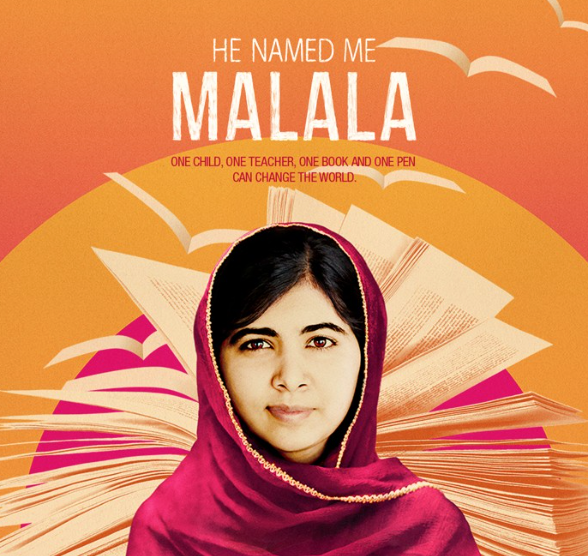 My daughters and I are planning a very special party at my house. We’ve invited our neighbors over for a movie, popcorn, laughter…and even some tears, inspiration, and global activism!
My daughters and I are planning a very special party at my house. We’ve invited our neighbors over for a movie, popcorn, laughter…and even some tears, inspiration, and global activism!
On Monday, February 29, the National Geographic channel will show the commercial-free U.S. television premiere of He Named Me Malala at 8:00 pm ET/7:00 pm CT. He Named Me Malala is Davis Guggenheim’s acclaimed film that tells the story of the world’s youngest Nobel Peace Prize winner and girls’ education activist Malala Yousafzai.
This is such a perfect chance for us World Moms in the U.S. to gather together families and children in our communities for a night of awareness and action! We can learn about what education for means for girls in Pakistan and be inspired by an extraordinary young leader just in time to push our government for increased global education funding.
My girls, 10 and 12 years old, are fledgling activists for global education. Together, we have read the young reader’s edition of Malala’s autobiography, “I am Malala,” and thoroughly enjoyed it. Her voice as an activist who started speaking out against the Taliban at age 11 reaches my kids in a way they can completely relate to even though they have never visited Malala’s native Pakistan. The book was thought provoking and funny, yet nothing really compares to seeing and hearing the words of a young person coming from her own mouth.
We have invited friends to come see the movie with us – friends who have lived in the U.S. their whole lives as well as those who have moved here from India, Pakistan, and China. I asked some of our guests to share with us their personal experiences of what they have seen in their home countries when girls were not allowed to participate in classes due to gender bias or poverty.
In Malala’s acceptance speech for the 2014 Nobel Peace Prize, she said, “I tell my story not because it is unique, but because it is the story of many girls.”
Each of these stories is important to lift up and share.
I hope that we can come to a greater understanding of each other’s perspectives. The stories of why some of our friends have moved here are deeply rooted in a desire for education, opportunity, and equality. Our goal is to learn from Malala and each other, then write letters to our elected senators and representatives with these stories and ask for the U.S. to include $125 million for the Global Partnership for Education to cost-effectively support access to quality education for all children.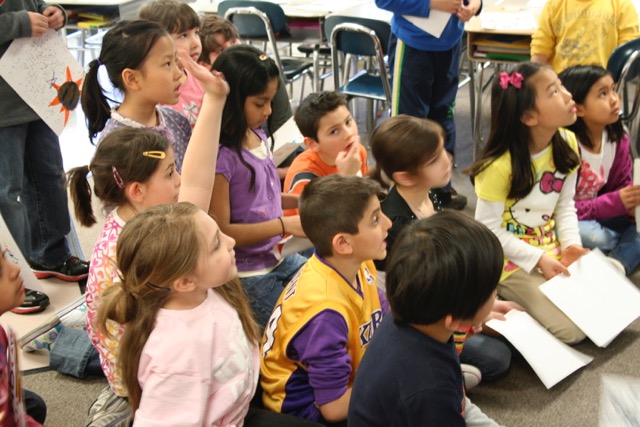
Our American leaders in power need to hear what the people they represent have gone through. Immigration stories are beautiful and part of the fabric of our local communities. They connect us to our global community and help us to understand our role in helping to promote gender equality, education, and health worldwide.
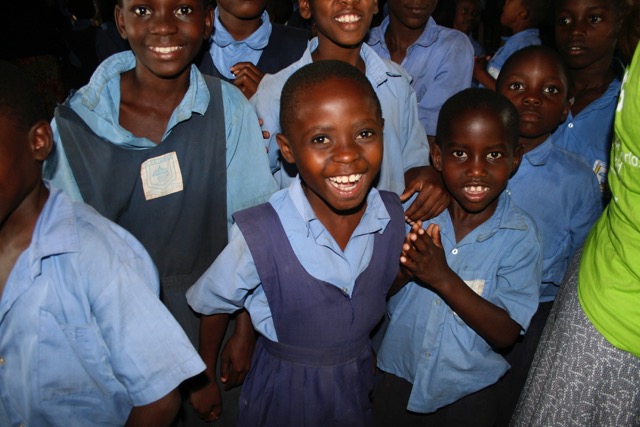 If you are living in the U.S., I encourage you to gather some friends and watch He Named Me Malala together. If you are out of the country, you may be able to purchase it on DVD to create your own watch party or read the Young Reader’s edition of “I Am Malala” as a book group with your kids. Read or watch, be inspired, and then share with us your ideas for helping all children achieve their dreams of education!
If you are living in the U.S., I encourage you to gather some friends and watch He Named Me Malala together. If you are out of the country, you may be able to purchase it on DVD to create your own watch party or read the Young Reader’s edition of “I Am Malala” as a book group with your kids. Read or watch, be inspired, and then share with us your ideas for helping all children achieve their dreams of education!
Will you be watching?
This is an original post written for World Moms Blog by Anti-Poverty Mom Cindy Levin.
Cynthia Changyit Levin is a mother, advocate, speaker, and author of the upcoming book “From Changing Diapers to Changing the World: Why Moms Make Great Advocates and How to Get Started.” A rare breed of non-partisan activist who works across a variety of issues, she coaches volunteers of all ages to build productive relationships with members of Congress. She advocated side-by-side with her two children from their toddler to teen years and crafted a new approach to advocacy based upon her strengths as a mother. Cynthia’s writing and work have appeared in The New York Times, The Financial Times, the Washington Post, and many other national and regional publications. She received the 2021 Cameron Duncan Media Award from RESULTS Educational Fund for her citizen journalism on poverty issues. When she’s not changing the world, Cynthia is usually curled up reading sci-fi/fantasy novels or comic books in which someone else is saving the world.
More Posts - Website
Follow Me:


by Jennifer Burden | Feb 18, 2016 | 2015, AIDS, North America, ONE, World Voice
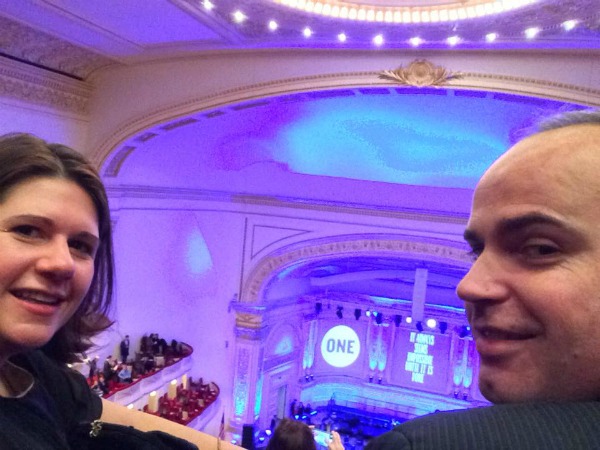
This past December, I accepted an invitation from the ONE Campaign to meet at Carnegie Hall for World AIDS Day, and Bono and the Edge would be playing. It was an event for some of their most active anti-poverty advocates.
I met my husband that evening in New York City, where he was working, and we headed to Carnegie Hall. We grabbed a drink and socialized before heading to our seats. I had received my first U2 CD as a gift for my 13th birthday from my childhood friend, Stephanie, and I’ve been a fan ever since.
There was no doubt that Bono was amazing on stage that night. The entire show was one of the best I’ve ever been to — The Edge, Jessie J, Hozier, Miley Cyrus and the Kinshasa Symphony from the Democratic Republic of the Condo all performed. President Bill Clinton, Vice President Joe Biden, Stephen Colbert and Sting were also there to talk about ending poverty and eradicating the worldwide AIDS epidemic. Host of the Daily Show, Trevor Noah, Mcd the evening. They were all amazing.
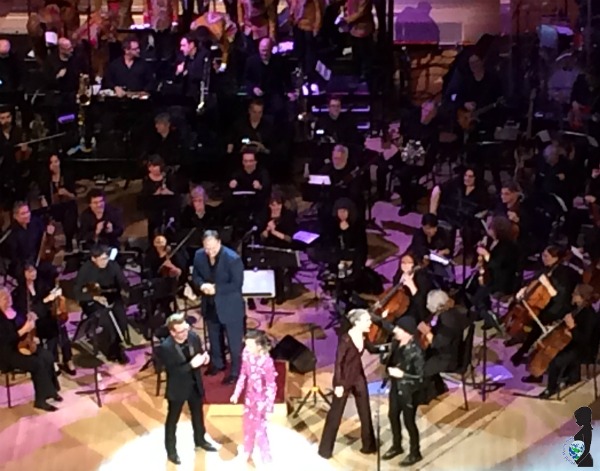
Bono, Miley Cyrus, Jessie J and Hozier perform at the ONE event for World AIDS Day in NYC December, 2015.
Stephen Colbert recognized two activists who were, as he thought, Hispanic, and he apologized in advance for botching their names. He then proceeded to thank a Mr. and Mrs. Gates, or as he pronounced it, “Gahtays”. Colbert always brings the funny.
The RED Campaign unveiled a larger product line where proceeds go to the Global Fund to help eliminate AIDS in Africa. The message of the night of the importance to eradicate AIDS was profound. But, what was different about this concert was the atmosphere of the everyday people sitting among us, many of whom Bono has inspired to advocacy.
Prior to the show starting, we met a woman who runs a ONE chapter at a New Jersey university along with her husband. She and her husband had been big U2 fans, which fueled their interest in becoming ONE Campaign leaders at the university. Her husband couldn’t make the event, so her 9-year old daughter joined her at the concert. How lucky for her young, impressionable ears to experience the messaging and music which was about to unfold. It was interesting to me to see how U2 fans had followed Bono’s lead by organizing and inspiring students to join the campaign to end poverty.
Once we grabbed our seats, I met another woman in my row who had worked in a record store for 17 years and now works in admissions at a New York City museum. She was also a diehard fan of Bono and U2, and had become equally diehard about ending poverty as an activist with the ONE Campaign.
After the show, I caught up with journalist and activist, Kristi York Wooten, who is as passionate about ending poverty as she is about music. It is no surprise, she is also a powerful activist for the ONE Campaign. Following the event, she wrote an article for The Huffington Post entitled “Can Mily Cyrus Educate Millennials about the Fight Against AIDS?“. She says,
“These statistics [about the growth of AIDS worldwide] should also be a rallying call to artists such as Cyrus, Hozier and Jessie J, who are already involved in fighting AIDS: make your voices louder and take cues from the generation of musicians who came before. At Carnegie Hall, Cyrus told the audience she hoped to see the end of AIDS in her lifetime. I hope she works toward that goal with us, because music still has an important role to play in this battle!”
Kristi hit the nail on the head. Music does still have an important role to play in activism. What is most compelling is Bono’s ability to go beyond the lyrics of his songs and to create a path for his listeners to take action to help people living in extreme poverty. He has worked with top people in the field to create a way in which people like you and me can be involved. Worldwide activists write letters to their governments, tweet, lobby, deliver petitions, you name it, in support of eradicating poverty.
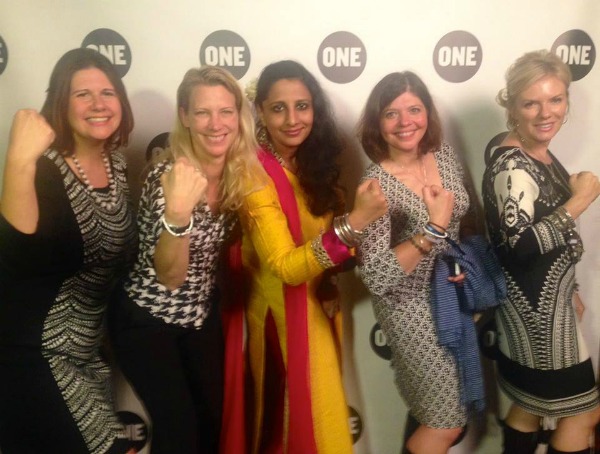
World Moms pose for a “Strengthie” with Neha Misra of Solar Sisters at a ONE Event in NYC in September, 2015.
The concert was incredible, but if I had to go back and do the night all over again, I’d take more chances to get to know the stories of more people in the seats and how Bono and music had inspired them to activism. We were all joined in feeling Bono’s impactful words:
“There is no first world or third world. There is only one world.”
I quickly pulled out my phone to tweet out that beautiful quote, and then got reprimanded by an usher. The tweet would have to wait until after the show. I am so used to being completely tuned in to social media at events, I had to give myself permission to just sit back and enjoy the show.
I was grateful to.
This is an original post to World Moms Blog by CEO and Founder, Jennifer Burden, of New Jersey, USA.
Photo credits to the author.

Jennifer Burden is the Founder and CEO of World Moms Network, an award winning website on global motherhood, culture, human rights and social good. World Moms Network writes from over 30 countries, has over 70 contributors and was listed by Forbes as one of the “Best 100 Websites for Women”, named a “must read” by The New York Times, and was recommended by The Times of India.
She was also invited to Uganda to view UNICEF’s family health programs with Shot@Life and was previously named a “Global Influencer Fellow” and “Social Media Fellow” by the UN Foundation. Jennifer was invited to the White House twice, including as a nominated "Changemaker" for the State of the World Women Summit. She also participated in the One Campaign’s first AYA Summit on the topic of women and girl empowerment and organized and spoke on an international panel at the World Bank in Washington, DC on the importance of a universal education for all girls. Her writing has been featured by Baby Center, Huffington Post, ONE.org, the UN Foundation’s Shot@Life, and The Gates Foundation’s “Impatient Optimists.” She is currently a candidate in Columbia University's School of International and Public Affairs in the Executive Masters of Public Affairs program, where she hopes to further her study of global policies affecting women and girls.
Jennifer can be found on Twitter @JenniferBurden.
More Posts - Website
Follow Me:


by Nicole Melancon (USA) | Feb 16, 2016 | 2016, Africa, Malaria, Social Good, World Voice
“If you think you’re too small to make a difference you haven’t spent a night with a mosquito”.‐ African proverb
The figures are staggering. According to the World Health Organization: “About 3.2 billion people – nearly half of the world’s population – are at risk of malaria. In 2015, there were roughly 214 million malaria cases and an estimated 438,000 malaria deaths. Sub-Saharan Africa continues to carry a disproportionately high share of the global malaria burden. In 2015, the region was home to 89% of malaria cases and 91% of malaria deaths. In areas with high transmission of malaria, children under 5 are particularly susceptible to infection, illness and death. More than two-thirds (70%) of all malaria deaths occur in this age group. In 2015, about 305,000 African children died before their fifth birthdays” making malaria the leading killer of children in Africa. (Source: WHO 2015 statistics).
Although these figures are frightening, what is even more shocking is that these deaths are entirely preventable. Per the World Health Organization, “Increased prevention and control measures have led to a 60% reduction in malaria mortality rates globally since 2000”. This is amazing progress that brings hope that we will be able to wipe malaria off the face of the earth forever.
Eradicating malaria is the dream of South African-based Goodbye Malaria, an organization I interviewed to learn how a team of African entrepreneurs, predominantly women sprayers and socially minded businesses, are coming together to “save a life in your sleep” and eradicate malaria in their lifetime. Here’s their story.
Goodbye Malaria began as a dream of successful African entrepreneur, Robbie Brozin, founder of Nando’s food chain. Robbie traveled throughout the African continent with Humanitarian adventurer, Kingsley Holgate, who is known as the most traveled man in all of Africa. During their travels, Robbie realized that malaria was killing so many people and no one was doing anything about it. In fact, malaria is the number one killer of children in Africa, yet is entirely preventable.
Inspired to do good and fight to end malaria, Brozin along with three other African entrepreneurs founded Goodbye Malaria in February 2013. Goodbye Malaria helps to raise funds to support on the ground malaria elimination programs in Mozambique, to educate and advocate against malaria all while creating employment across the continent. Their beautiful online shop which sells products that “save a life in your sleep” offers African-made pajamas, bracelets, slippers, pencil boxes and teddy bears, all which employ local women and protect families in Mozambique against malaria.
How it works:
Goodbye Malaria employs a crew of both male and female sprayers (over 70% of the sprayers are women) who go house to house within the communities and spray the inside of the homes with a specially formatted insecticide to kill malaria-transmitting mosquitoes. Goodbye Malaria provides extensive training for the sprayers whose job is not easy. They must wear heavy, protective uniforms and masks in often very hot weather. Yet, the job is rewarding and there has been much success. In Southern Mozambique’s Maputo Province, the results from a preliminary pilot project from the first Goodbye Malaria spray round started in October 2013 show that the population of Boane district has been protected for two consecutive years, and prevalence has been reduced by 70%.
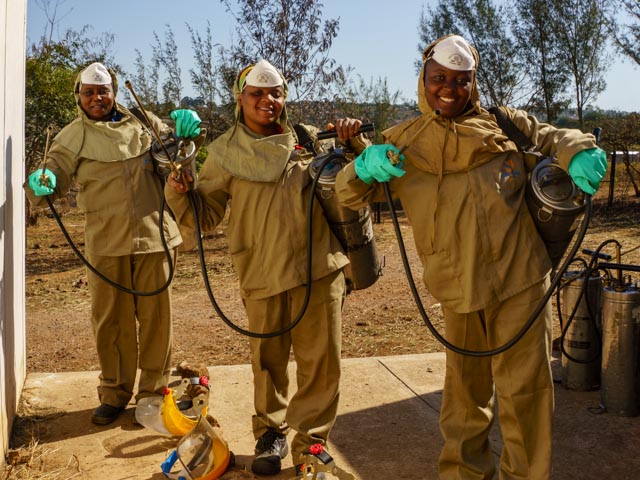
Goodbye Malaria Women Sprayers
Why Mozambique?
Although Goodbye Malaria is based in South Africa, South Africa does not have malaria. Mozambique was a logical place for Goodbye Malaria to start their work since it borders South Africa, has a high rate of malaria transmission, and also has special ties with the Nandos and Goodbye Malaria founder Robbie Brozin. Nando’s famous chicken originated in Mozambique. Their award-winning “peri-peri” sauce is made from red hot chilis grown there. Goodbye Malaria works directly with the government of Mozambique and other non-profit organizations on the ground in two large areas of the country. Roughly 200,000 people have been impacted by their work yet there is much more to do.
“Save a Life in your Sleep”:
Goodbye Malaria operates as a Social Benefit Organization (SBO) not a NGO (non-governmental organization) meaning in addition to outside funding, they also use profits from products to go directly to support their operations on the ground. Goodbye Malaria’s tagline is “Save a Life in your Sleep”. By shopping at Goodbye Malaria’s online store, your purchase helps in two ways. First, by creating jobs that support local South African entrepreneurs. Second, the proceeds directly fund the spray program in Mozambique.
The head of Goodbye Malaria’s merchandizing, Kim Lazarus explained that the products are all about changing lives and saving lives. There is a link between how woman in South Africa are making products that will make a difference in the lives of their sisters in Mozambique. It is a wonderful concept.
The products:
The online shop at Goodbye Malaria offers some wonderful products for sale and provides shipping right in the US. Every product is made in South Africa, and the products are 100% transparent, sustainable and ethically sourced.
 Homemade “Shwe Shwe” pajama bottoms: Shwe Shwe is a popular South African fabric. It is bright, colorful and authentic. The idea behind the pajamas is that you are covered at night while someone else sleeps safely at night in Mozambique (as mosquitos mostly bite at night). They also make pencil boxes, hats, and slippers out of the same cotton fabric.
Homemade “Shwe Shwe” pajama bottoms: Shwe Shwe is a popular South African fabric. It is bright, colorful and authentic. The idea behind the pajamas is that you are covered at night while someone else sleeps safely at night in Mozambique (as mosquitos mostly bite at night). They also make pencil boxes, hats, and slippers out of the same cotton fabric.
Teddy Bears: The homemade teddy bears are another special story. Each bear is unique and made by a different woman. The bears are called the “Mashozi” bear which means “the woman wears the pants”. The name came after Kinsley’s late wife who was an inspiration.
Bracelets: The Goodbye Malaria bracelets are made by the “go gos” – a term used for grannies who watch children who lost their parents from HIV/AIDS. Making the beads and bracelets provides them with extra income and they also involve the children in the process.
I thoroughly enjoyed my Skype call with co-founder Kim Lazarius. When I ended the call, I sat in wonder and amazement feeling completely inspired that there are such amazing people in the world doing good and saving lives, with passion. I instantly ordered a pair of Goodbye Malaria pajama bottoms for myself for the holidays. When I wear them, I can think about how fortunate I am to not have to worry about malaria but also that I’m hopefully saving a life while I sleep.
To learn more about Goodbye Malaria, click here. To view their online shop, click here.
This is an original post written for World Moms Blog by Nicole Melancon of ThirdEyeMom.com.

Third Eye Mom is a stay-at-home mom living in Minneapolis, Minnesota with her two children Max (6) and Sophia (4). Her children keep her continually busy and she is constantly amazed by the imagination, energy and joy of life that they possess! A world wanderer at heart, she has also been fortunate to have visited over 30 countries by either traveling, working, studying or volunteering and she continues to keep on the traveling path.
A graduate of French and International Relations from the University of Wisconsin Madison, where she met her husband Paul, she has always been a Midwest gal living in Minnesota, Wisconsin and Chicago. This adventurous mom loves to be outside doing anything athletic (hiking, running, biking, skiing, snowshoeing or simply enjoying nature), to travel and volunteer abroad, to write, and to spend time with her beloved family and friends.
Her latest venture involves her dream to raise enough money on her own to build and open a brand-new school in rural Nepal, and to teach her children to live compassionately, open-minded lives that understand different cultures and the importance of giving back to those in need. Third Eye Mom believes strongly in the value of making a difference in the world, no matter how small it may be. If there is a will, there is a way, and that anything is possible (as long as you set your heart and mind to it!).
Visit her on her blog, Thirdeyemom, where she writes about her travels and experiences in other lands!
More Posts

by World Moms Blog | Feb 9, 2016 | 2016, Asia, Birthing, Clean Birth Kits, Ewa Samples, Humanitarian, International, Maternal Health, World Moms Blog, World Voice
World Moms Blog has been supporting the mission of CleanBirth.org, founded by contributor Krysin Zalota, from the beginning. After all, we are a group of moms here, so it has made us even more compassionate to the need for safe, sterile birth for the sake of both babies and their mamas. In the villages where Cleanbirth.org operates women traditionally give birth alone in the forest. Laos has one of the highest maternal mortality rates in the region.
You can follow our fundraising efforts and join in — only $5 provides a clean birth kit! — here: http://cleanbirth.causevox.com/world-moms-blog. We’ve already raised $490! Please help us break $500!
In 2015, its third full year of operation, Cleanbirth.org has provided 1,179 moms in the program in Laos with clean births, where there were zero reports of infections and where 170 nurses were trained. We continue to support the organization and maternal health worldwide, not just on the World Moms Blog site, but on many of our personal blogs, as well. Here are a few of the blog posts and campaigns that World Moms contributors have launched this year around Cleanbirth.org.
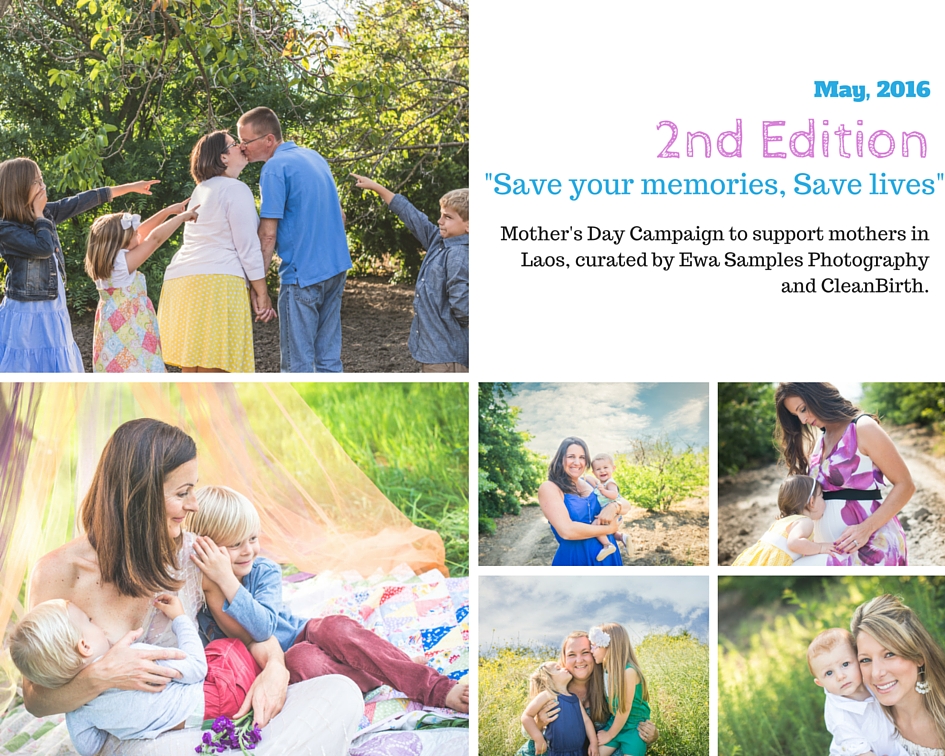
This May, Ewa Samples from Ewa Samples Photography and CleanBirth are coming together for a second edition of a Mother’s Day Campaign to raise funds to help moms in Laos together.
Last year they were able to raise almost $600 in two days! This year, they invite everyone in the Bay Area, California, to join in to support this wonderful cause.
Ewa will be offering special packages for family photography sessions, where part of the profit will be donated to CleanBirth.
Our Managing Editor, Elizabeth Atalay, in Rhode Island, USA wrote about Cleanbirth.org this month on her blog, Documama:
$5.00 Can Save 2 Lives With CleanBirth.org
Over in the United Arab Emirates, World Mom, KC of Mummy in Transit, also wrote about why helping make births safer in Laos is important to her!:
http://www.mummyintransit.com/2016/01/28/maternal-care-around-the-world/
Nicole Melancon did this fantastic interview with Clean Birth Founder Kristyn Zalota in 2015:
One Mom’s Quest to Save Mother’s Lives in Laos
Sophia of ThinkSayBe shared her birth stories in support of Cleanbirth.org this year:
“Reading about what CleanBirth.org definitely made me assess my own pregnancies and the access we (my babies and I) had to clean and modern facilities in case of emergencies during the pregnancy, and for a safe delivery to my babies and myself.”
https://thinksaybe.wordpress.com/2016/01/29/mahood-a-mothers-story-of-maternal-care/
And, here is our post on World Moms Blog introducing the kick off of the Cleanbirth.org campaign!
http://www.worldmomsblog.com/2016/01/26/world-voice-a-small-pink-bag-a-nurse-and-you/
This is an original post to World Moms Blog.
*We apologize for the choppy first version of this post that was published. Our editors were facing technical difficulties!
World Moms Blog is an award winning website which writes from over 30 countries on the topics of motherhood, culture, human rights and social good. Over 70 international contributors share their stories from around the globe, bonded by the common thread of motherhood and wanting a better world for their children.
World Moms Blog was listed by Forbes Woman as one of the "Best 100 Websites for Women 2012 & 2013" and also called a "must read" by the NY Times Motherlode in 2013. Our Senior Editor in India, Purnima Ramakrishnan, was awarded the BlogHer International Activist Award in 2013.
More Posts

by Tes Silverman | Feb 2, 2016 | 2016, Asia, Journalism, North America, Philippines, World Voice
 Where in the world do you live? And, are you from there?
Where in the world do you live? And, are you from there?
My name is Tes Silverman and I live in Huntington, NY but I was born in Manila, Philippines.
What language(s) do you speak?
I speak English but I also speak some French and a little Tagalog, which is the Philippine national language.
When did you first become a mother (year/age)?
I became a Mom when I gave birth to my daughter, Shaina, in 1999.
Are you a stay-at-home mom or do you do other work in or outside the home?
I am stay-at-home Mom but I work as a free-lance journalist and food writer for a Long Island, NY newspaper.
Why do you blog/write?
I have been a blogger for my personal blog, The Pinay Perspective for six years. The initial reason for my blog was to reconnect with Filipinas outside of the United States, but as I started writing about motherhood, parenting and topics that related to women’s issues, I started receiving feedback from women all around the world. I continue to blog & write because it gives me the opportunity to write about women and families, as well as gender and human rights – all issues I’m passionate about. My goal has always been to raise awareness regarding these topics.
What makes you unique as a mother?
I believe that I am different from other mothers because while I have always made sure to take care of my daughter’s needs first, I always make time to connect with other Moms I have befriended through Shaina. From those friendships, I started a Mom’s night out with my Mom friends sixteen years ago. It meant going out for dinner once a month so we could relax and talk about things that were important to us besides motherhood. Since then, some of my friends have moved away or just haven’t had the time to spare, but there are two Moms from the original Mothers group that still get together for dinner with me once in a while.
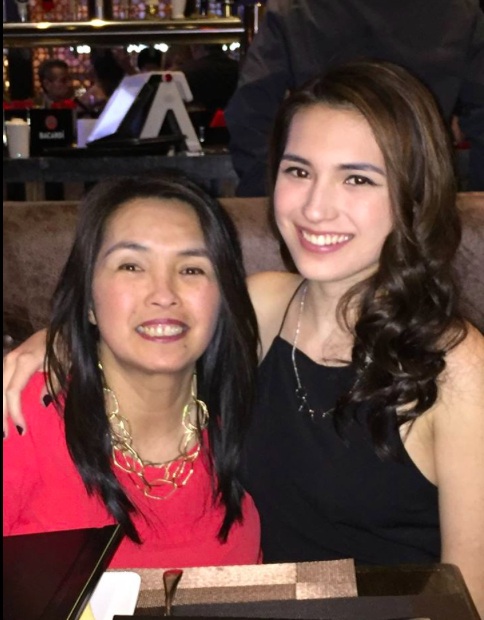
The author with her daughter
What do you view as the challenges of raising a child in today’s world?
As someone who has a teen daughter, I believe that raising a child today can be challenging due to constant exposure to social media. Social media has its place in today’s society, but it is should not replace the emotional connection between parents and children.
How did you find World Moms Blog?
I heard about World Moms Blog from attending the Mom+Social Good Summit and hearing one of the speakers talk about the work they do with Moms around the world.
This is an original post by World Moms Blog Contributor Tes Silverman of PinayPerspective.

Tes Silverman was born in Manila, Philippines and has been a New Yorker for over 30 years. Moving from the Philippines to New York opened the doors to the possibility of a life of writing and travel. Before starting a family, she traveled to Iceland, Portugal, Belgium, and France, all the while writing about the people she met through her adventures. After starting a family, she became a freelance writer for publications such as Newsday’s Parents & Children and various local newspapers. Fifteen years ago, she created her blog, The Pinay Perspective. PinayPerspective.com is designed to provide women of all ages and nationalities the space to discuss the similarities and differences on how we view life and the world around us. As a result of her blog, she has written for BlogHer.com and has been invited to attend and blog about the Social Good Summit and Mom+Social Good. In addition, she is a World Voice Editor for World Moms Network and was Managing Editor for a local grass roots activism group, ATLI(Action Together Long Island). Currently residing in Virginia Beach, VA with her husband, fourteen year-old Morkie and a three year old Lab Mix, she continues to write stories of women and children who make an impact in their communities and provide them a place to vocalize their passions.
More Posts - Website
Follow Me:





 This Thursday, March 3rd, an event in Japan known as Girls Day, a day of reflection and prayers for the health and happiness of daughters, comes at a time when women’s voices are not being heard.
This Thursday, March 3rd, an event in Japan known as Girls Day, a day of reflection and prayers for the health and happiness of daughters, comes at a time when women’s voices are not being heard. 






 My daughters and I are planning a very special party at my house. We’ve invited our neighbors over for a movie, popcorn, laughter…and even some tears, inspiration, and global activism!
My daughters and I are planning a very special party at my house. We’ve invited our neighbors over for a movie, popcorn, laughter…and even some tears, inspiration, and global activism!
 If you are living in the U.S., I encourage you to gather some friends and watch He Named Me Malala together. If you are out of the country, you may be able to
If you are living in the U.S., I encourage you to gather some friends and watch He Named Me Malala together. If you are out of the country, you may be able to 





 Homemade “Shwe Shwe” pajama bottoms: Shwe Shwe is a popular South African fabric. It is bright, colorful and authentic. The idea behind the pajamas is that you are covered at night while someone else sleeps safely at night in Mozambique (as mosquitos mostly bite at night). They also make pencil boxes, hats, and slippers out of the same cotton fabric.
Homemade “Shwe Shwe” pajama bottoms: Shwe Shwe is a popular South African fabric. It is bright, colorful and authentic. The idea behind the pajamas is that you are covered at night while someone else sleeps safely at night in Mozambique (as mosquitos mostly bite at night). They also make pencil boxes, hats, and slippers out of the same cotton fabric.


 Where in the world do you live? And, are you from there?
Where in the world do you live? And, are you from there?



